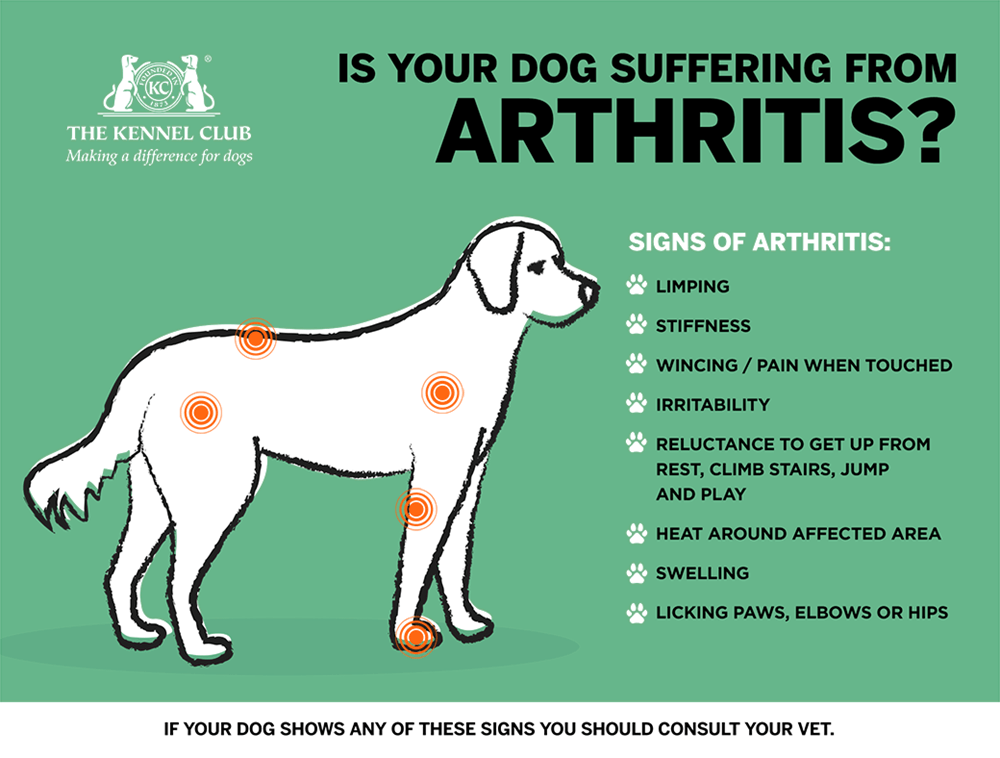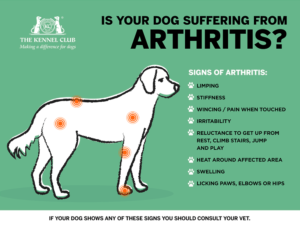Arthritis is a condition many of us may be familiar with, either through friends or relatives. And just as with humans, arthritis in dogs is very painful, and debilitating. Dogs, of course, don’t express their pain in ways we may always understand. Nonetheless, when arthritis begins to progress, we may notice subtle signs our dog is feeling off color. He may not jump up for treats, or sit on his hind legs like he used to. His gait may be slower, and more awkward. He may be irritable, particularly when its cold and damp.

Arthritis in dogs is not simply one condition, although most of us think of osteoarthritis when we talk about this condition. Osteoarthritis is the degenerative condition that is commonly associated with aging. It is, however, only one type or arthritis in dogs, albeit the most common.
Broadly speaking, there are three categories of arthritis in dogs. These are:
- degenerative joint disease (osteoarthritis)
- immune mediated arthritis
- infectious arthritis
It is important to get a proper diagnosis of which type of arthritis your dog has, as the treatments are quite different. For example, if your dog has infectious arthritis, he may need antibiotics, or treatment for another underlying issue that is causing the arthritis. In immune-mediated arthritis, treatment usually involves anti-inflammatory and immunosuppressive drugs. These drugs could have quite a negative effect on your dog if, for example, he has infectious arthritis.
Infectious Arthritis
Infectious arthritis in dogs can be caused by a number of different infectious agents. The types of infectious arthritis are:
- bacterial
- mycoplasma and L form bacterial arthritis
- rickettsial arthritis
- spirochetal arthritis
- viral arthritis
- fungal arthritis
As you can see, the cause can be viral, bacterial, or fungal. Initially, x-rays may appear normal, with only soft tissue swelling and increased fluid in the joint cavity. This increased fluid can affect the surrounding tissue, however, particularly if time progresses and it is left untreated. This effect may be seen in xrays later. Bone damage doesn’t usually occur in the early stages. If it does continue without treatment, bone erosion can occur, the joint space can collapse, and degenerative joint disease develops.
Infectious arthritis is treatable, however. Treatment will depend on what is causing it.
Immune-Mediated Arthritis
This category of arthritis includes rheumatoid arthritis, which is a type or erosive arthritis. Erosive arthritis means the cartilage and joint degenerates over time. It is a term used to distinguish against other types of immune-mediated arthritis that are ‘non erosive’ – that is, a form of arthritis where there is inflammation and swelling, but no destruction of the joint.
Immune-mediated arthritis is so named because the disease involves an inappropriate response of the dog’s immune system. Basically, it seems to attack the dog’s own connective tissue. This inappropriate immune response may be the result of another underlying medical condition (such as cancer), or occur on its’ own. In the latter case, it is known as ‘primary’ or ‘idiopathic’ immune mediated arthritis. Often, the process of diagnosis involves eliminating the other types of arthritis as a cause. This can be done by your vet using joint x-rays and lab tests, which may include a synovial fluid analysis as well as blood work.
Primary (idiopathic) immune-mediated arthritis has four types. The first is most common, and in it the dog only has lameness, although other parts of the body may be involved, such as the skin, the kidneys, urinary tract, and eyes. In the second type, there are infections in other parts of the body, and the dog will show signs of lameness as well as infection. These other infections can affect the tonsils, lungs, mouth, urinary tract, uterus, eyes, or skin. The third type is associated with gastrointestinal disease such as ulcerative colitis or associated with chronic, active hepatitis and cirrhosis of the liver. Finally, a dog may have cancer in another part of the body and this also affects the joints in an arthritic fashion.
Other types of non-erosive arthritis include systemic lupus erythematosus (SLE), polyarthritis/polymyositis complex, sjogren syndrome, and polyarthritis/meningitis syndrome.
Treatment for immune-mediated arthritis is generally anti-inflammatory and immuno-suppressive drugs. These drugs can include steroids and low dose chemotherapy drugs that act to suppress the immune system.
Degenerative Joint Disease
Degenerative joint disease, or osteoarthritis can affect both young and old dogs. It can be caused by
- hip dysplasia
- elbow dysplasia
- ruptured cruciate ligaments
- patella luxation
- joint trauma
- or other known issues
Degenerative arthritis may simply be caused by normal wear and tear, with no underlying condition. This would generally affect only older dogs. This is a non-inflammatory disease, and is treated with pain medication and a class of drugs known as chondroprotectants. Chondroprotectants help prevent breakdown of cartilage, and are best used in the early stages of arthritis.
References:
1. Radiographic Interpretation For The Small Animal Clinician
2. Giffin & Carlson, Dog Owner’s Home Veterinary Handbook
3. https://www.thekennelclub.org.uk/health-and-dog-care/health/health-and-care/a-z-of-health-and-care-issues/arthritis/




